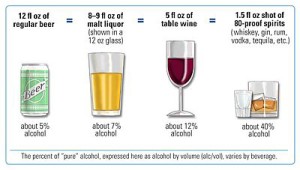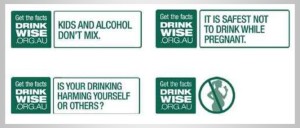 April is Alcohol Awareness Month. Because this month is centered right between two holidays associated with alcohol, St. Patrick’s Day and Cinco de Mayo, now is a great time to discuss the recommendations related to alcohol use.
April is Alcohol Awareness Month. Because this month is centered right between two holidays associated with alcohol, St. Patrick’s Day and Cinco de Mayo, now is a great time to discuss the recommendations related to alcohol use.
What are the recommendations for consuming alcohol?
The Academy of Nutrition and Dietetics and the CDC recommend that adults age 21 years of age and older drink in moderation. This means women consume no more than one drink/serving per day, and men consume no more than two drinks/servings per day.
What is a serving of alcohol?
I often find there is confusion as to what constitutes a serving of alcohol, since there are so many options out there. A serving of alcohol is any drink that provides ½ fluid ounce of pure alcohol. This means a 12 oz. beer, 5 oz. of wine, or 1.5 oz. of 80-proof whiskey, scotch, gin, or vodka. Today, there are varying sizes of alcoholic drinks served at a bar or restaurant as well as for alcohol purchased at a store. You may be consuming multiple servings in “1” drink.
How many calories are in alcohol?
Sometimes we forget that the beverages we consume can have just as many calories as a meal, so we need to be aware of the drinks we consume. You can find a complete list of the caloric count of alcoholic beverages through the USDA. Below is the average calories for drinks.
Beer: 150 calories
Distilled Spirits: 100 calories
Wine: 100 calories for white, 105 calories for red
 Who Should Avoid Alcohol?
Who Should Avoid Alcohol?
It’s important to remember that alcoholic beverages are okay to consume in moderation, but there are certain populations who should avoid these drinks all together. Children, pregnant women, women of child-bearing age who are trying to get pregnant, individuals on certain medications that could interact with alcohol (ask your pharmacist), and some individuals who have autoimmune and/or inflammatory diseases should avoid alcohol. If you are following the Anti-inflammatory diet, it is important to avoid too much alcohol, practicing moderation and if drinking wine choosing red.
What Are My Options for Healthier Drinks?
Okay, so we all want the opportunity to enjoy a drink every once in a while. Here are some tips for making healthier choices:
- Make your own. You know what you’re putting in it, so you can determine the calorie count.
- Get out the measure cups and measure the amount of alcohol you’re adding to your drink. They even sell special wine glasses with the oz. marked on the glass to help with portion control.
- Ask for a glass of water, too. When you order your drink, ask the server for water, and drink the two together. This makes your drink last longer, you stay hydrated, and you don’t drink as much.
- Be aware of mixed drinks. When you order or make mixed drinks, you are adding additional calories; think a rum and coke, or Red Bull and vodka. These may have twice or three times as many calories and sugar, because of the additional beverage. This is also the case for drinks with juice. Instead consider mixing with seltzer or club soda which are calorie free.
If you or someone you know is having trouble with alcohol and/or addiction, there are resources to help.
Alcoholics Anonymous
Al-Anon Family Group Headquarters
National Council on Alcoholism and Drug Dependence, Inc.
National Institute on Alcohol Abuse and Alcoholism
Often we work with clients who want to lose weight and they eat pretty healthy, but consume a lot of extra calories from alcoholic drinks which adds to their weight gain. Cutting back on frequency or quantity of alcohol drinks and/or changing to lower calorie options can help.
Also, a friendly reminder to not drink and drive! Call a sober friend, a taxi, or uber if needed!